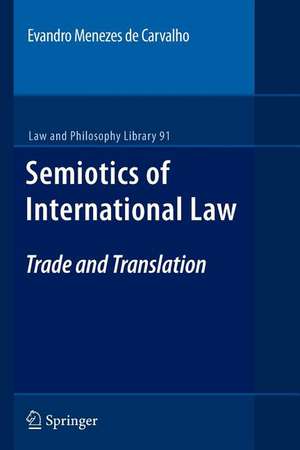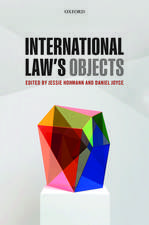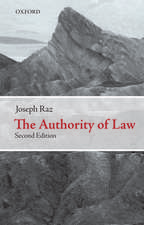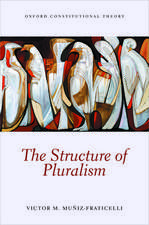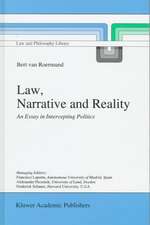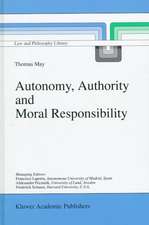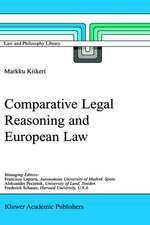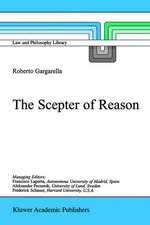Semiotics of International Law: Trade and Translation: Law and Philosophy Library, cartea 91
Autor Evandro Menezes de Carvalhoen Limba Engleză Paperback – dec 2012
The diversity of languages and legal systems can enrich the possibilities of understanding and developing international law, but it can also represent an instability and unsafety factor to the international scenario. This multilegal-system and multilingual scenario adds to the complexity of international law and poses new challenges. One of them is legal translation, which is a field of knowledge and professional skill that has not been the subject of theoretical thinking on the part of legal scholars. How to negotiate, draft or interpret an international treaty that mirrors what the parties, – who belong to different legal cultures and who, on many occasions, speak different mother tongues – ,want or wanted to say?
By analyzing the decision-making process and the legal discourse adopted by the WTO’s Appellate Body, this book highlights the active role of language in diplomatic negotiations and in interpreting international law. In addition, it also shows that the debate on the effectiveness and legitimacy of International Law cannot be separated from the linguistic issue.
| Toate formatele și edițiile | Preț | Express |
|---|---|---|
| Paperback (1) | 638.24 lei 6-8 săpt. | |
| SPRINGER NETHERLANDS – dec 2012 | 638.24 lei 6-8 săpt. | |
| Hardback (1) | 644.49 lei 6-8 săpt. | |
| SPRINGER NETHERLANDS – 31 oct 2010 | 644.49 lei 6-8 săpt. |
Din seria Law and Philosophy Library
- 20%
 Preț: 813.11 lei
Preț: 813.11 lei - 20%
 Preț: 569.00 lei
Preț: 569.00 lei - 18%
 Preț: 1225.16 lei
Preț: 1225.16 lei - 18%
 Preț: 950.66 lei
Preț: 950.66 lei - 15%
 Preț: 583.43 lei
Preț: 583.43 lei - 15%
 Preț: 639.25 lei
Preț: 639.25 lei - 15%
 Preț: 641.53 lei
Preț: 641.53 lei - 18%
 Preț: 893.84 lei
Preț: 893.84 lei - 24%
 Preț: 797.39 lei
Preț: 797.39 lei - 15%
 Preț: 579.84 lei
Preț: 579.84 lei - 15%
 Preț: 644.95 lei
Preț: 644.95 lei - 18%
 Preț: 895.76 lei
Preț: 895.76 lei - 15%
 Preț: 644.95 lei
Preț: 644.95 lei - 20%
 Preț: 571.85 lei
Preț: 571.85 lei - 15%
 Preț: 642.03 lei
Preț: 642.03 lei - 18%
 Preț: 1232.26 lei
Preț: 1232.26 lei - 18%
 Preț: 1116.05 lei
Preț: 1116.05 lei - 15%
 Preț: 655.92 lei
Preț: 655.92 lei - 18%
 Preț: 833.54 lei
Preț: 833.54 lei - 18%
 Preț: 898.26 lei
Preț: 898.26 lei - 18%
 Preț: 1016.63 lei
Preț: 1016.63 lei -
 Preț: 390.25 lei
Preț: 390.25 lei - 24%
 Preț: 700.89 lei
Preț: 700.89 lei - 18%
 Preț: 999.60 lei
Preț: 999.60 lei - 18%
 Preț: 1115.77 lei
Preț: 1115.77 lei - 18%
 Preț: 1107.88 lei
Preț: 1107.88 lei - 15%
 Preț: 637.46 lei
Preț: 637.46 lei - 18%
 Preț: 781.94 lei
Preț: 781.94 lei - 24%
 Preț: 815.54 lei
Preț: 815.54 lei - 18%
 Preț: 786.18 lei
Preț: 786.18 lei - 18%
 Preț: 735.21 lei
Preț: 735.21 lei - 15%
 Preț: 653.33 lei
Preț: 653.33 lei - 18%
 Preț: 782.10 lei
Preț: 782.10 lei
Preț: 638.24 lei
Preț vechi: 750.88 lei
-15% Nou
Puncte Express: 957
Preț estimativ în valută:
122.17€ • 132.74$ • 102.69£
122.17€ • 132.74$ • 102.69£
Carte tipărită la comandă
Livrare economică 21 aprilie-05 mai
Preluare comenzi: 021 569.72.76
Specificații
ISBN-13: 9789400733961
ISBN-10: 9400733968
Pagini: 252
Ilustrații: XXXII, 220 p.
Dimensiuni: 155 x 235 x 13 mm
Greutate: 0.36 kg
Ediția:2011
Editura: SPRINGER NETHERLANDS
Colecția Springer
Seria Law and Philosophy Library
Locul publicării:Dordrecht, Netherlands
ISBN-10: 9400733968
Pagini: 252
Ilustrații: XXXII, 220 p.
Dimensiuni: 155 x 235 x 13 mm
Greutate: 0.36 kg
Ediția:2011
Editura: SPRINGER NETHERLANDS
Colecția Springer
Seria Law and Philosophy Library
Locul publicării:Dordrecht, Netherlands
Public țintă
ResearchCuprins
Introduction.- Part One International Legal Discourse.- Section I – Legal Culture Building Legal Discourse.- Chapter 1 – Culture And Legal Culture: A Semiotic Approach.- Chapter 2 – Legal Culture As A System Of Signification.- Chapter 3 – Legal Culture As Communication.- Section II – On Diplomatic Discourse And The Legal-Diplomatic Discourse.- Chapter 4 – Diplomatic Discourse.- Chapter 5 – Legal-Diplomatic Discourse.- Chapter 6 – The Power Of Legal-Diplomatic Discourse.- Conclusion To Part One.- Part Two THE WTO Decision-Making Discourse.- Section III – The Circumstances Of Decision-Making Discourse.- Chapter 7 – From The Gatt To The Wto: Regulating International Trade.- Chapter 8 – The Wto Dispute Settlement System And The Influence Of The Decision-Making Instances Of The Dispute Settlement Body.-Section IV – The Linguistic Context In The Decision-Making Discourse Of The Appellate Body.-Chapter 9 – The Choice Of Meaning In Discourse.- Chapter 10 – The Authors Of Legal-Diplomatic Discourse: Interpreters And Intentions.- Chapter 11 – The Decision-Making Discourse Of The Appellate Body: Treaties And Dictionaries As Referents.- Conclusion.- List Of Sources.
Textul de pe ultima copertă
Language carries more than meanings; language conveys a means of conceiving the world. In this sense, national legal systems expressed through national languages organize the Law based on their own understanding of reality. International Law becomes, in this context, the meeting point where different legal cultures and different views of world intersect. The diversity of languages and legal systems can enrich the possibilities of understanding and developing international law, but it can also represent an instability and unsafety factor to the international scenario. This multilegal-system and multilingual scenario adds to the complexity of international law and poses new challenges. One of them is legal translation, which is a field of knowledge and professional skill that has not been the subject of theoretical thinking on the part of legal scholars. How to negotiate, draft or interpret an international treaty that mirrors what the parties, – who belong to different legal cultures and who, on many occasions, speak different mother tongues – , want or wanted to say? By analyzing the decision-making process and the legal discourse adopted by the WTO’s Appellate Body, this book highlights the active role of language in diplomatic negotiations and in interpreting international law. In addition, it also shows that the debate on the effectiveness and legitimacy of International Law cannot be separated from the linguistic issue. “Studies as Evandro Menezes de Carvalho’s are essentialto those who wish to work in the field of International Trade Law, not only because they can be directly applied to a semiotic analysis of the reports of the Appellate Body, but also because of how much they represent as a method of research and thought within the other areas of International Trade Law. For this reason, I highly recommend this book as a necessary tool to those working in International Trade Law.” Luiz Olavo BaptistaFormer member of the WTO Appellate Body(2001-2009)
Caracteristici
A unique semiotic approach. Underscores how our multicultural and multilingual world challenges all practitioners of international law. New perspectives on the role of the juridical-diplomatic discourse in constructing an international order. Clearly shows shows how the dispute for meaning in a legal context represents not only a semantic problem, but a subtle dispute of world visions.
